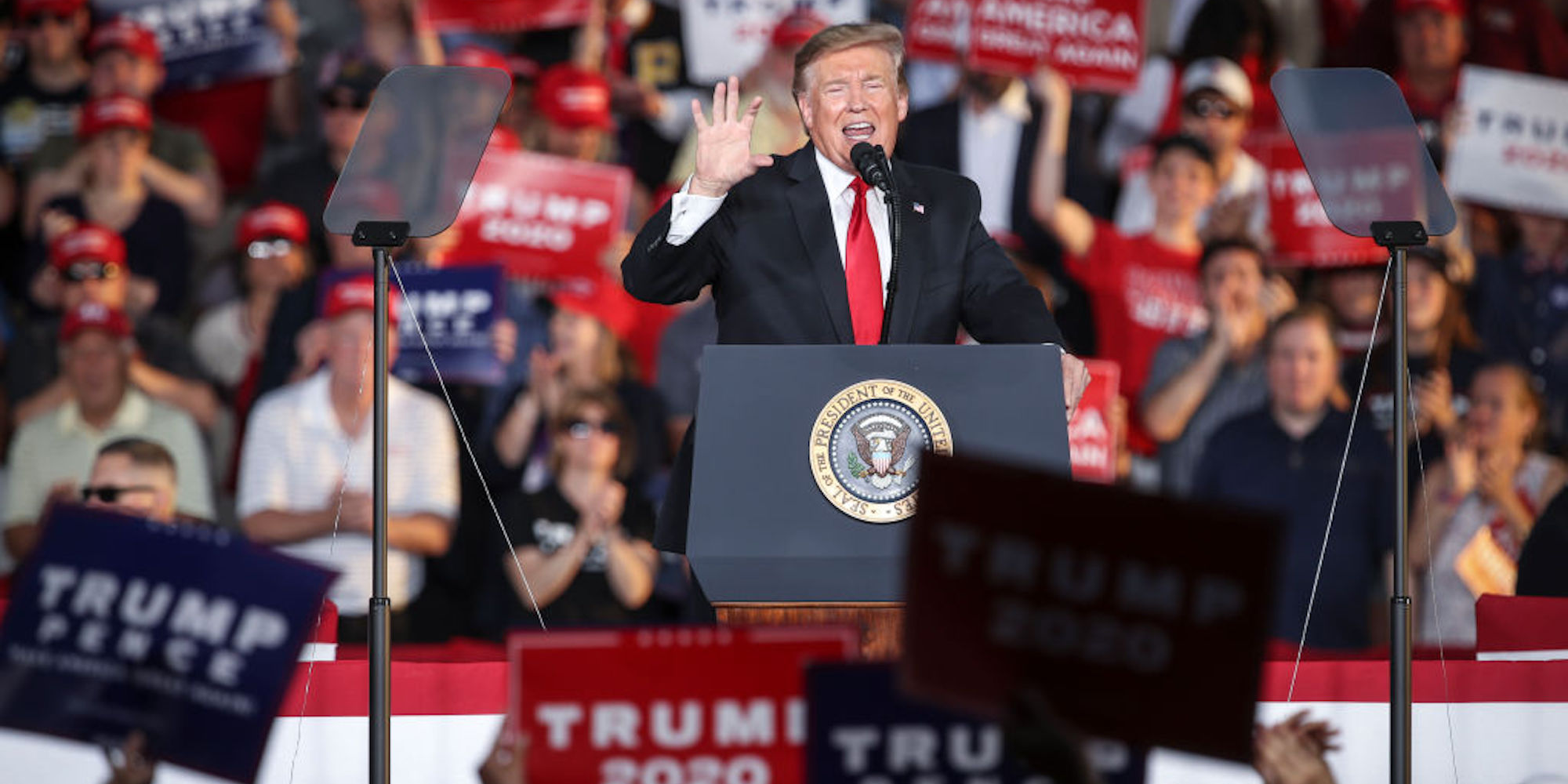- Many analysts believe that a recession would tank US President Donald Trump’s chances of reelection in 2020, with the president having staked his reelection campaign on the performance of the economy during his presidency.
- Some economists and commentators believe that Trump’s trade war with China and divisive culture wars are more popular with Republicans and some swing voters than is believed, and could help the president clinch victory even in the event of a recession.
- In a recession, Trump would likely double down on a bid to portray Democrats as radical socialists whose policies would further dent American prosperity.
- Visit Business Insider’s homepage for more stories.
With signs emerging of a slowdown in the US economy, commentators and analysts have been nearly unanimous about one thing: that it could be disastrous for President Trump’s chances for reelection in 2020.
Trump has staked his reelection appeal to swing voters on the strength of the US economy during his presidency, and if that is removed, few see other signature achievements the divisive president can cite to convince voters to give him another four years in the White House.
After asking “what happens in a recession?” New York Times columnist Ross Douthat wrote that “First, the easy part: Donald Trump loses re-election … there is no way a president so widely disliked survives the evaporation of his boom.”
Trump himself is reportedly rattled by the prospect of a recession as his reelection campaign gears up, lashing out at opponents and the media, who he has accused of trying to precipitate a recession to hasten the end of his presidency.
But some analysts aren't so sure, and say that even if Trump's worst case scenario comes true and the American economy contracts, there remains a clear path the president could take to victory, becoming the first president since William McKinley in 1900 to win reelection in the face of a recession in the final two years of his first term.

Economists are pointing to the role played by Trump's trade war on China as key in precipitating the current slowdown, and some analysts say the tariffs he has imposed on China and the price US consumers are paying will dent his popularity.
Read more: Trump says it doesn't matter if the US has a recession because the trade war is more important
But Ioana Mariescu, a public policy professor at the University of Pennsylvania, said that Trump's hardline stance towards China was popular among voters in Rust Belt states which have lost jobs to China and which were key to Trump's 2016 election victory.
"Imposing tariffs on Chinese goods may increase Trump's support among this constituency of trade-impacted workers. The net result of the tariffs depends on how the upset over price increases will play out against the cheers from the anti-trade Trump supporters," she wrote for Vox.
Trump on Wednesday was unrepentant about waging trade war on China, claiming it had to be done despite likely "short term" economic pain.
Farmers have been among those most impacted by Trump's tariffs war with China, but their support has not wavered, with 79% of farmers approving of the president, according to a recent Farm Pulse survey.
"Most farmers in the rural parts of the U.S. have conservative values" and align with the GOP, Republican political strategist Ray Zaborney told MSNBC.
"Between their values and the president standing up for them, they're willing to give him some leeway."

The economy usually ranks as among the top concerns of voters in the US.
However, Trump's huge popularity among Republicans - he has an approval rating of 89%, according to a Gallup poll - is about something else as well: The increasingly divisive and racially-charged culture war he is waging against those whom he claims are out to disenfranchise ordinary Americans.
His supporters love it, and are unlikely to abandon him even if the economy falters, say some observers.
"Despite some Trump backers citing economic anxiety as a top reason for supporting him, his willingness to respond to his supporters' cultural anxiety is the hallmark of his reelection campaign," wrote the Washington Post's Eugene Scott.
And with Trump's strategy in 2020 as it was in 2016 premised on maximizing turn out from his core voters, it could yet be a winning strategy.

Some Republican strategists believe that even in an economic downturn, the president will be able to paint his Democratic opponent as a radical socialist whose policies would likely further imperil America's future prosperity.
Though it remains far from clear who will emerge as the winner among the crowded field of Democratic hopefuls, the party membership has pulled to the left in recent years.
"Swing voters believe lower taxes are better for them and higher taxes are worse for them," GOP strategist Brad Todd told Bloomberg.
"As Democrats move further toward socialism, that will not help them take advantage of any deterioration in the economy, because anybody in America who's not a raging liberal believes socialism makes the economy worse."

